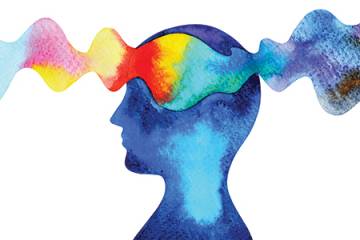In his 1975 book, Realms of the Human Unconscious, Stanislav Grof wrote, "Psychedelics, used responsibly and with proper caution, would be for psychiatry what the microscope is to the study of biology and medicine or the telescope for astronomy." The former Johns Hopkins professor of psychology had the experience to back it up. From 1967 to 1973, at Hopkins and the nearby Maryland Psychiatric Research Center, Grof had overseen thousands of patients undergoing LSD-assisted psycho?therapy, many of whom experienced the resolution of deep, persistent trauma as a result.
But by the time Grof's book came out, there was one glaring problem. Psychedelics—and clinical studies of their therapeutic properties— were illegal.
Determined to find a way to help patients achieve altered states of consciousness without breaking the law, Grof and his wife, Christina, developed a form of rapid, heavy breathing they said could trigger something akin to a psychedelic trip, in particular its intense emotions, sensory distortions, and surprising insights. Holotropic Breathwork, as they dubbed it, draws its name from the Greek words holos, which means "whole," and trepein, which means "moving toward." In tandem with therapy, they alleged, Holotropic Breathwork could help patients sort through the broken pieces of themselves to find a sense of wholeness.
The method is most often practiced in a group setting, with participants paired up to alternate as "breather" and "sitter." During their turn, the breather lies on a mat with their eyes closed, breathing as hard and quickly as possible—essentially hyperventilating—while the sitter perches nearby to offer support, such as water, pillows, or just a comforting presence. The room is kept dark and suffused with loud, rhythmic music. Once the breather reaches an altered state of consciousness, they are encouraged to continue breathing heavily, or simply at a rate that will maintain the psychedelic effect. A trained facilitator leads the initial breathing exercises, monitors participants' safety, and oversees discussions before and after the six-hour session (three hours for each breather).
According to the Grofs, the altered state reached during Holotropic Breathwork awakens an "inner healer" in the breather, "which transcends the knowledge … of an individual practitioner or from any specific school of psychotherapy." The therapy has been practiced by tens of thousands of people for more than 40 years, but, according to Matthew Johnson, a Johns Hopkins professor of psychiatry and behavioral sciences, research to confirm its efficacy has been "minor, anecdotal, and not carried out at large institutions." Until now.
Johnson is the principal investigator of an upcoming, first-of-its-kind study that will examine what impact Holotropic Breathwork might have on veterans suffering from post-traumatic stress disorder. The Psykia Institute, an organization dedicated to the study and promotion of psychedelic and breathwork therapies, will provide funding and outreach assistance. Stan Grof will serve as an adviser.
According to the U.S. Department of Veterans Affairs, the number of veterans with PTSD varies by conflict, from 11% of those who served in Afghanistan to 31% of Vietnam War vets. PTSD is caused by experiencing or bearing witness to a terrifying event—violent combat, for example, or the death of a fellow servicemember—and its symptoms include nightmares, hypervigilance, and rage. The disorder is often accompanied by depression and anxiety. Two-thirds of patients with PTSD do not respond to traditional treatments, such as cognitive processing and exposure therapies.
Recently, encouraging results have come from studies involving the use of MDMA—commonly known as ecstasy—to treat PTSD. In May 2021, a clinical trial showed that roughly two-thirds of PTSD sufferers who underwent MDMA-assisted psychotherapy no longer qualified for a diagnosis following the trial, and nearly all participants experienced "clinically significant improvements." The organization behind this work, the Multidisciplinary Association for Psychedelic Studies, anticipates that the U.S. Food and Drug Administration will approve the therapeutic use of MDMA by 2023.
Scientists aren't exactly sure what makes MDMA so effective, but patients report that the drug makes them feel safe, empathetic, and emotionally open, an ideal frame of mind for therapeutic breakthroughs. Additionally, brain scans have shown that MDMA suppresses the amygdala, the part of the brain involved in processing fear and panic, allowing patients to work through traumatic memories more comfortably. Could Holotropic Breathwork produce the same response?
"If our results are half as good as the MDMA study, it would be revolutionary," Johnson says. He argues that while psychedelic-assisted treatments continue to show promise, they come with a number of drawbacks. With psychedelics, for example, patients are "strapped into the roller coaster ride," as he puts it, regardless of any discomfort that might arise; they can't untake the pill. Breathwork allows for adjustments and the ability to suspend treatment instantaneously.
Also see
Additionally, strict regulations make psychedelic research and implementation a logistical nightmare, and there's always the potential for abuse. If Holotropic Breathwork is shown to be effective, "it could be implemented by the VA tomorrow," Johnson says. "That's a beautiful thing."
The study, which was delayed by the pandemic ("breathing heavily in a closed room is about the most COVID-unfriendly treatment you could imagine," Johnson says), will include three sessions of breathwork and involve both short- and long-term follow-ups. While there are few inherent risks involved in Holotropic Breathwork, participants will be screened carefully for any health concerns that might be exacerbated by prolonged heavy breathing.
Johnson says that there's been a "blind skepticism" of breathwork heretofore. "Things like this aren't taken seriously by medical professions; people assume it's all wishful thinking." He's hopeful that the study will provide concrete evidence that will change minds, in more ways than one.
Posted in Science+Technology
Tagged mental health, psychiatry, ptsd, veterans, psychedelics













